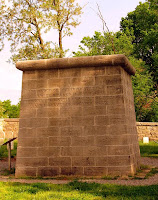
1 Corinthians 9:24-27
Do you not know that in a race all the runners run, but only one receives the prize? So run that you may obtain it. Every athlete exercises self-control in all things. They do it to receive a perishable wreath, but we an imperishable. So I do not run aimlessly; I do not box as one beating the air. But I discipline my body and keep it under control, lest after preaching to others I myself should be disqualified.
Do you know how hard it is to score 10 in an Olympic gymnastics event or break a long jump world record in track and field?
?
No you don't.
Nadia Comaneci was the first person to ever earn a "perfect 10" during the 1976 Montreal Olympics, but a new scoring system makes no more "perfect 10s" possible.
In 1935, Jesse Owens set a long jump world record that stood for 25 years. Bob Beamon in the "perfect jump" in Mexico City exceeded the world record by almost two feet launching books written about this super-human feat. But in 1991, Mike Powell outlasted Carl Lewis, also setting a new world record which has now stood another 20 years.
We have no idea how hard that is.
Self-discipline is the most difficult undertaking. And reaching perfection? Impossible.
Listen, I even have to discipline myself to do nothing!
For me even getting to sleep is a chore. If you are getting older and feel lucky to get just four or five hours sleep, you have to discipline yourself just to get rest. Handling worries, responsibilities, and obligations are like the miniscule fine-tunings for which gymnasts or sprinters adjusts just to eek out one extra centimeter or add one one hundredths of a point.
It takes work.
St. Paul used the imagery of athletic games to speak about the discipline of faith.
What makes competition at world class levels like the Olympics so difficult is the focus one needs. All other considerations and distractions jeopardize reaching the goal.
Not only is intense focus necessary, the training is relentless. No one gets past the trials if training isn't 1000%.
In our Christian faith the prize of heaven and eternal life make a gold medal look like something from a Cracker Jack box. We have the aim of finishing our run here not perched on a box but standing at the very gates of paradise! Can any super-human focus, exercise, or effort accomplish that?
When world records are eventually broken, medals have tarnished and even famous athletes go around on brittle knees and in the long run are eventually carried to their final resting places, can the impossible occur that you and I qualify to enter heaven!
If even specimens of great human achievement, beautiful athletic bodies, and heralded champions fade, how can you and I expect a battle-scared, weary, obscure and undistinguished Christian to come through as victor?
?
Not through any super-human effort.
Rather, a very human one.
It was one very human man, one man made of the same flesh and blood as you and I, not a superman or a hero or some earthly title holder who won the day. It wasn't someone acclaimed by the press or showered with accolades as he stepped forward to bear the "agony of defeat." Indeed, it was a man conquered by the cross.
His body was bloodied. His limbs were overcome with exhaustion. He wasn't even praised at the finish. He was mocked.
But Jesus Christ never lost his focus on the goal--which was to win for you eternal life. He tirelessly schooled himself in God's Word, set his face and body toward an exertion no sinful man could withstand and reached His goal for you.
He was the only person who maintained the flawless focus, unblemished self-discipline, and spiritual wholesomeness which are the mark of true human achievement.
Do you know how hard that is?
?
No you don't.
But you do know Him! You know the man Jesus Christ who is God and Savior. He didn't come from Mt. Olympus. He comes to us from Mt. Calvary.
St. Paul knew Jesus. Trusting Him, as Christians ever since have done, we run this race of life, like Paul--- as those who receive the prize. Christ has not made us "also-rans." He has declared us recipients of all the honors he won for us. He has pronounced us heirs of glory and recipients of imperishable wreaths of beauty. He has qualified us for the heavenly prize of eternal life and made us the promise it will never tarnish. His record will never be broken.
In this consummate victory of our Lord we live and stretch and run ourselves--and win. Through Jesus' running and outlasting death itself to rise in triumph, you and I can run this race, not aimlessly or with fear of disqualification, but with wings on our feet, the thrill of the Gospel in our ears, and the shouts of saints and angels cheering us on.







